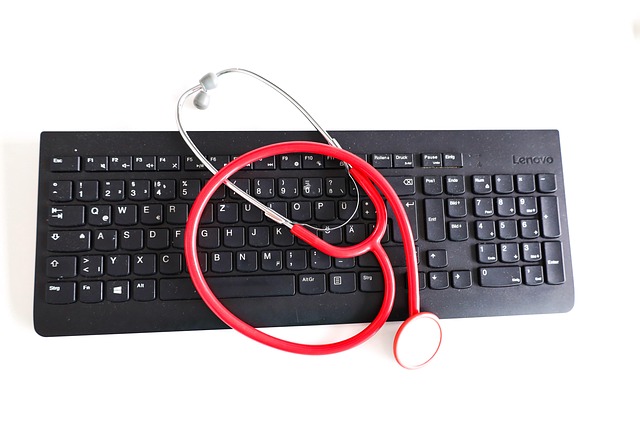Semaglutide, a groundbreaking diabetes medication, now offers patients remote access to healthcare through online consultations and digital monitoring tools. As a GLP-1 receptor agonist, it controls blood sugar, promotes weight loss, and reduces cardiovascular risk. Digital solutions enable patients to connect with healthcare professionals from home, facilitating personalized dosage guidance, addressing concerns, and tracking treatment progress. This innovation enhances accessibility, patient compliance, and management for semaglutide therapy, revolutionizing diabetes care in the digital age while addressing privacy and security challenges.
In today’s digital era, the healthcare landscape is transforming with innovative solutions like digital monitoring for semaglutide treatment. This article explores the convergence of semaglutide therapy—a game-changing medication for diabetes management—with cutting-edge technology. From understanding the benefits of semaglutide to delving into online consultations and integrating digital tools, we navigate the rise of remote patient care. Discover how these advancements enhance treatment accessibility while addressing challenges and ethical considerations.
Understanding Semaglutide Therapy and Its Benefits

Semaglutide, a groundbreaking medication, has transformed diabetes management. It’s a glucagon-like peptide-1 (GLP-1) receptor agonist, mimicking the natural hormone GLP-1 to regulate blood sugar levels. This innovative approach offers numerous benefits for patients; it not only aids in glycemic control but also promotes weight loss and reduces cardiovascular risk. The convenience of semaglutide therapy is further enhanced through digital tools, allowing patients to receive guidance and monitoring via online consultations.
This modern method provides patients with easy access to healthcare professionals who can offer personalized advice on dosage adjustments, address concerns, and track treatment progress. With just a few clicks, individuals on semaglutide treatment can benefit from remote care, ensuring optimal blood sugar management while enjoying the flexibility of digital interactions.
The Rise of Digital Monitoring in Healthcare

In today’s digital era, healthcare is undergoing a profound transformation with the rise of digital monitoring technologies. This shift is particularly evident in drug treatments like semaglutide, where remote monitoring has become an increasingly preferred approach. Patients are now able to receive personalized care through innovative solutions such as online consultations, eliminating the need for frequent in-person visits.
Digital monitoring offers several advantages, including enhanced accessibility, improved patient compliance, and more efficient healthcare delivery. With semaglutide, a medication often prescribed for diabetes management, remote tracking allows healthcare providers to monitor patients’ progress, adjust dosages, and offer support without requiring constant physical proximity. This advancement in technology is revolutionizing how we manage treatments, making care more convenient and responsive to individual patient needs.
Online Consultations: A Convenient Approach for Patients

In the digital age, online consultations have become a convenient and accessible way for patients to receive medical advice and management for conditions like diabetes. Semaglutide, a medication used in diabetes treatment, can now be effectively monitored and discussed through virtual platforms. This approach is particularly beneficial for individuals who prefer remote care or face challenges in attending physical appointments, offering flexibility and comfort while maintaining patient-doctor interactions.
Semaglutide online consultation allows healthcare providers to remotely assess patients’ progress, review treatment plans, and offer tailored guidance. Through video conferencing, secure messaging, and digital health platforms, patients can share their symptoms, side effects, and test results, enabling doctors to make informed decisions and adjust treatments accordingly. This modern approach streamlines care coordination, ensuring patients receive timely support and education while fostering a more engaging and efficient healthcare experience.
Integrating Semaglutide Treatment with Digital Tools

In recent years, the integration of digital tools has revolutionized healthcare management, and this shift is particularly evident in the administration of semaglutide treatment. Semaglutide, a medication widely used for type 2 diabetes management, benefits greatly from online consultation platforms and monitoring apps. These digital solutions enable patients to access medical advice remotely, eliminating geographical barriers and enhancing convenience. Through secure video conferencing, patients can discuss their treatment plans, receive guidance on dosage adjustments, and address any concerns with healthcare professionals from the comfort of their homes.
Moreover, digital tools offer a seamless way to monitor semaglutide therapy. Mobile applications designed for this purpose allow patients to record their daily routines, meal intake, and blood glucose levels, providing real-time data to both patients and healthcare providers. This continuous monitoring facilitates timely interventions, improves treatment adherence, and promotes better diabetes management. With the touch of a button, patients can share their progress, enabling rapid response and personalized care adjustments.
Advantages of Digital Monitoring for Semaglutide Users

Digital monitoring offers significant advantages for individuals managing their semaglutide treatment. Through telemedicine and online consultations, patients can conveniently access healthcare professionals from the comfort of their homes. This accessibility is particularly beneficial for those in remote areas or with limited mobility, ensuring they receive regular guidance and support throughout their therapy.
Moreover, digital tools enable continuous tracking of treatment outcomes. Semaglutide users can share their progress, side effects, and medication adherence in real-time, allowing healthcare providers to make informed adjustments promptly. This proactive approach personalizes the treatment plan, potentially improving patient satisfaction and clinical results.
Potential Challenges and Ethical Considerations

The digital monitoring of semaglutide treatment presents several potential challenges and ethical considerations. One key issue is ensuring patient privacy and data security during online consultations, as sensitive health information must be handled with utmost care to prevent unauthorized access or breaches. Additionally, the reliability of remote monitoring systems must be rigorously tested to guarantee accurate assessments and timely interventions, especially in regions with limited healthcare infrastructure.
Ethical concerns arise from the potential for digital disparities, where unequal access to technology or internet connectivity could exacerbate existing healthcare inequalities. Furthermore, patient autonomy and informed consent become critical factors, as individuals must fully comprehend the implications of online consultations and be guaranteed the right to withdraw at any time. Balancing these challenges with the benefits of enhanced accessibility and continuous care is essential for a successful digital monitoring program.
Future Prospects: Enhancing Patient Care through Technology

The future of diabetes management looks set to be transformed by digital technologies, particularly in the context of semaglutide treatment. Online consultations and remote monitoring tools are poised to become game-changers, offering patients more autonomy and convenience while enabling healthcare providers to offer personalized care at a distance. This shift could see semaglutide therapy accessible to a wider population, especially in areas with limited medical resources.
Through digital platforms, patients can receive regular feedback on their blood glucose levels, dosages, and overall treatment progress. Such real-time data will empower individuals to make informed decisions about their health and foster a closer partnership between patient and doctor. Moreover, the integration of artificial intelligence could facilitate personalized medication adjustments, ensuring optimal results and enhancing overall patient care.
